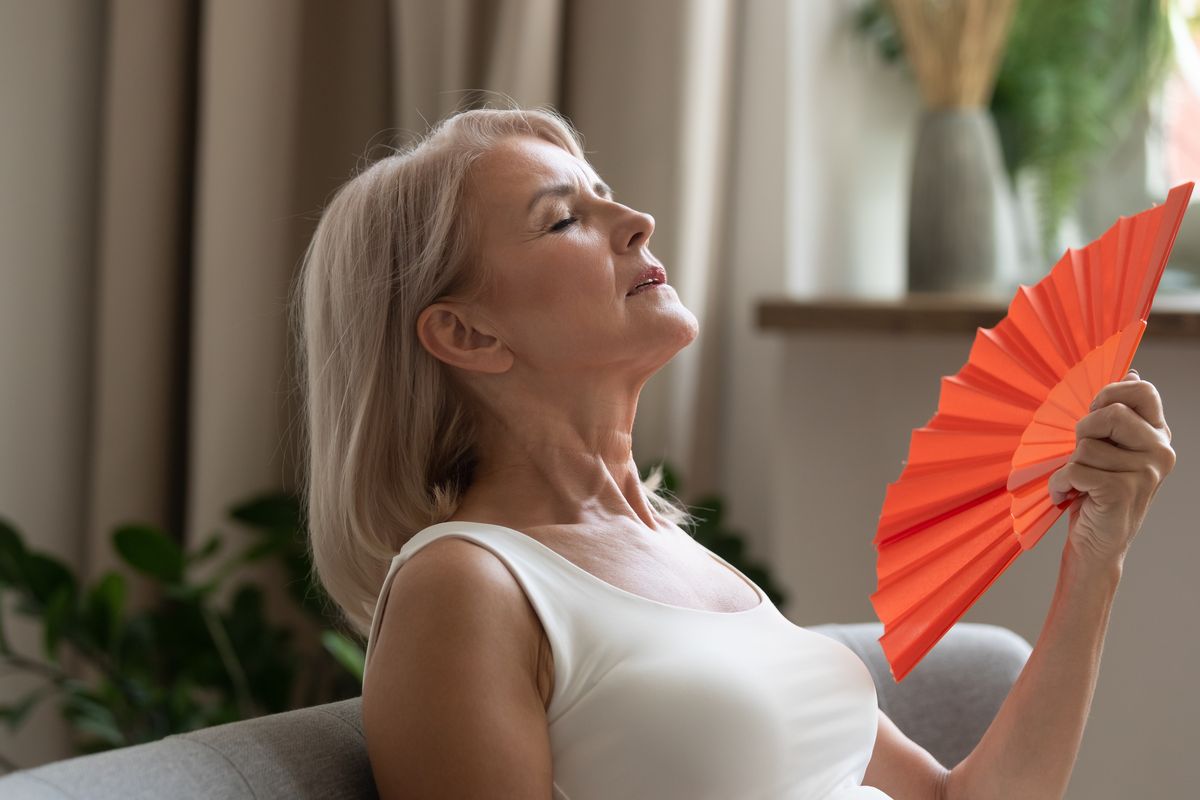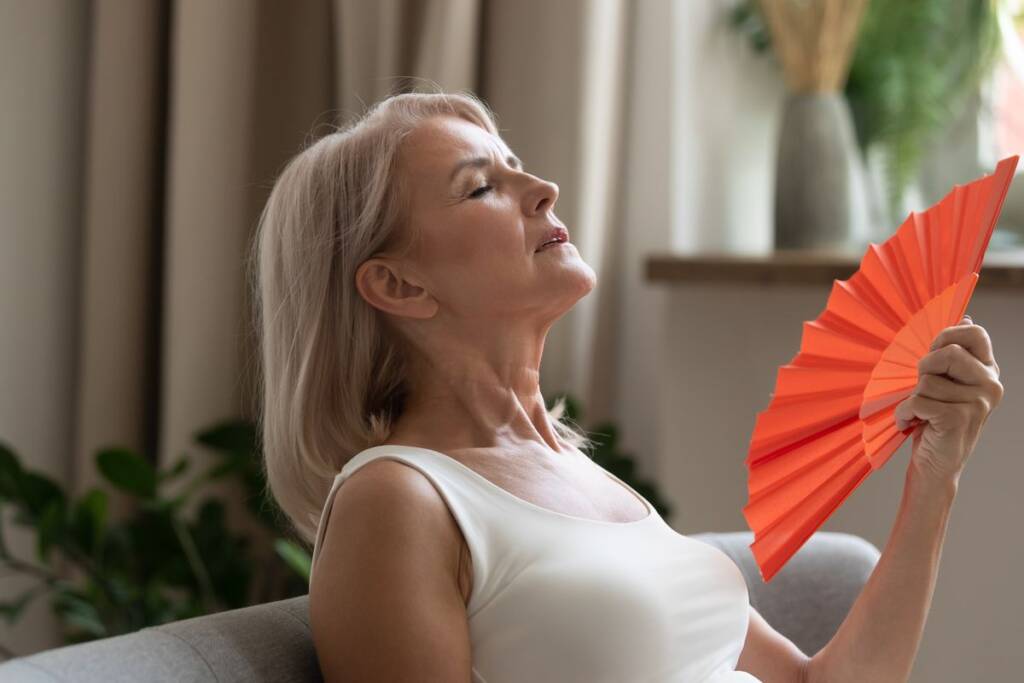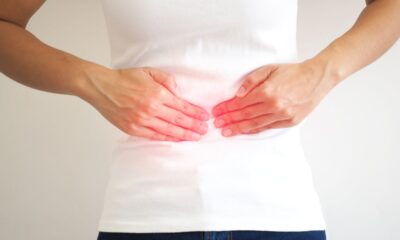Health
Warning: these tips can rekindle your desire in menopause

If you are a woman in your 40s or 50s, chances are you've started experiencing menopausal symptoms.
Hot flashes , night sweats , mood swings , loss of desire , and weight gain are just some of the most common.
But did you know that there are natural ways to relieve these symptoms? Here are some simple tips:
- Stay cool . Wear loose, comfortable clothes and keep the temperature in your home or office cool. If hot flashes keep you awake at night, try sleeping with a fan next to your bed.
- Exercise regularly . Exercise can help reduce hot flashes, night sweats, and other symptoms of menopause. It also helps improve sleep quality and reduce stress levels.
- Eat a healthy diet . Eating lots of fruits, vegetables, and whole grains can help reduce menopausal symptoms. Avoiding processed foods, caffeine, and alcohol can also be helpful.
- Try natural supplements . There are several herbs that have been shown to be effective in relieving menopausal symptoms, including black cohosh and ginseng. Before taking any supplements, however, discuss them with your doctor.
- Stay hydrated . Drinking plenty of water and other fluids can help reduce hot flashes and night sweats.
- Consider hormone therapy . If natural remedies don't relieve symptoms, your doctor may recommend hormone therapy (HT). HT can come in the form of pills, patches or creams.
If you are experiencing symptoms of menopause, talk to your doctor about the best way to alleviate them. There are many options available, so you don't have to suffer from discomfort. With a little help, you can get back to enjoying your life.

Psychological distress in menopause
Many women are surprised to learn that psychological distress can be one of the most debilitating symptoms during menopause. Depression , anxiety , and mood swings are all common psychological symptoms associated with menopause.
If you are struggling with any of these symptoms, it is important that you seek the help of a mental health professional. There are many treatment options, so you won't have to suffer alone. With proper treatment, you can get back to enjoying your life.
How to combat psychological distress in menopause
There are several things that can be done to combat psychological distress during menopause. Here are some tips:
- Stay in touch . Make sure you stay in touch with friends and family. Social support can be crucial in times of stress.
- Exercise . Exercise is a great way to reduce stress and improve mood. It can also help you sleep better at night.
- Eat a healthy diet . Eating lots of fruits, vegetables, and whole grains can help improve mood and reduce symptoms of menopause. Avoiding processed foods, caffeine, and alcohol can also be helpful.
- Try relaxation techniques . There are several relaxation techniques that can be helpful in reducing stress, such as yoga, meditation, or deep breathing exercises.
- Consider therapy . If you are struggling with severe psychological distress, your doctor may recommend treatment.
If you are struggling with psychological distress during menopause, it is important that you seek help. There are many treatment options, so you don't have to suffer alone. With proper treatment, you can get back to enjoying your life.
Decreased desire in menopause
One of the most common ailments in menopause is a decrease in sexual desire . This can be due to a number of factors, including hormonal changes, fatigue and stress.
If you are struggling with a lack of sexual desire, there are several things you can do to improve your experience.
It's no secret that sex can be a little different after menopause. For some women, sex becomes less pleasant and even painful. But that doesn't mean you have to say goodbye to your sex life! There are many ways to make menopausal sex more enjoyable.
There are also some practical steps you can take to make menopausal sex more comfortable. In fact, many women find that using lubrication helps reduce pain and discomfort during sex.
Here are some tips:
- Talk to your partner . Communication is key in any relationship. If you are struggling with a lack of sexual desire, be sure to talk to him about it. He may be able to offer support and understanding.
- Exercise . Exercise is a great way to reduce stress and improve mood. It can also help increase blood flow to the genitals, thereby improving sexual performance and maintaining a healthy level of libido.
- Try a natural supplement . There are many supplements for menopause on the market that work on multiple fronts, so if you are interested in a natural approach click here .
Natural remedies for the loss of desire in menopause
Here are 3 natural remedies that can help improve sex drive in menopause:
- Maca root . This Peruvian herb has been shown to increase libido and sexual function in postmenopausal women. It can be taken in capsule form or added to smoothies or other foods.
- Ginseng . This popular herb has been used for centuries to treat a variety of health problems, including low libido. It can be taken in capsule form or added to tea.
- Red raspberry leaf tea . This herbal tea is rich in nutrients that can help tone the uterine muscles, improving sexual activity. It can also help reduce menopausal symptoms, such as hot flashes and night sweats.
Discomfort with menopause hair loss
One of the most common ailments in menopause is hair loss . This can be due to several factors, including hormonal changes, stress, and nutritional deficiencies. If you are struggling with hair loss, there are several things you can do to improve your experience.
Here are 5 tips:
- Talk to your doctor . If you are struggling with hair loss, be sure to talk to your doctor. He or she can offer support and understanding.
- Exercise . Exercise is a great way to reduce stress and improve circulation. It can also help increase blood flow to the scalp, promoting hair growth.
- Follow a healthy diet . Eat plenty of fruits, vegetables, and whole grains. Also make sure you are getting enough protein.
- Consider supplements . There are several supplements that can be helpful for hair loss, such as biotin or fish oil.
- Try natural remedies . There are several natural remedies that can help improve hair growth, such as green tea or saw palmetto.
If you are struggling with hair loss during menopause, it is important that you seek help. There are many treatment options available, so you don't have to suffer alone. With proper treatment, you can get back to enjoying your life.
Conclusion
Menopause can be a difficult time for many women. However, there are things you can do to improve your experience. Talk to your doctor, exercise and eat a healthy diet.
You may also want to consider supplements or natural remedies. With proper treatment, you can get back to enjoying your life.
Riproduzione riservata © - WT











